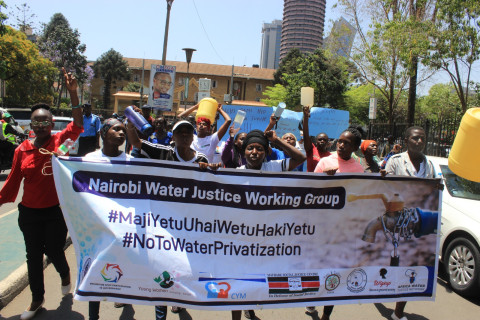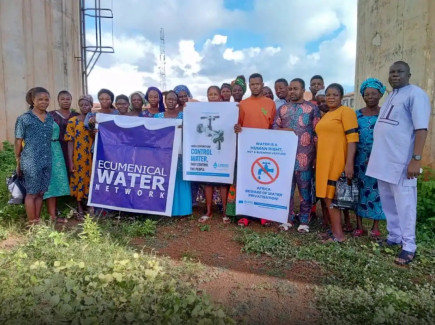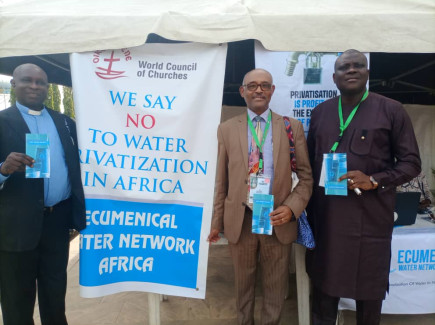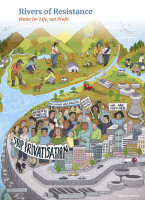From Silos to A Pan-African Front The Africa Water Justice Network, Uniting Water Commoning Struggles Against Capital
Regions
Millions on the African continent do not have access to clean drinking water. The current state can be traced back to Africa's colonial past, when water was claimed and used for colonial economic projects only, with access for social uses restricted based on race and class. This legacy continues today, as water resources are being privatized by corporations that create artificial scarcity through unequal distribution. The Africa Water Justice Network (AWJN) emerged to unite like-minded movements across the continent, at both national and local levels, in order to achieve common ownership of water resources.

Nairobi Water Justice Working Group
It is an agreed fact that water is life, or better yet water is for life as stated by a South African water justice activist, Faeza Meyer.1 In fact, one cannot exhaust the list of phrases related to the importance of water. As Sultana reminds us, what all these statements/slogans have in common is the truth that water is indispensable in our lives.2
However, water is as much a political issue as it is a socio-economic one, because its availability, access, use and governance are all affected by political decisions, often coming from a certain ideological perspective. Thus, it’s not by accident that Africa is among the least water-secure regions in the world. Despite the urgency of addressing the climate crisis, Africa’s water resources continue to be depleted to the extent that today over 411 million people lack basic drinking water and 1.1 billion live without access to safely managed sanitation.3
This state of affairs is an historical injustice rooted in colonial decisions, which claimed ownership of water as they did all land and natural resources on the continent, regulating them in the colonial powers’ interest.4 Water thus became a tool for controlling Africans and a resource for colonial economic projects, with its access for social uses restricted according to race and class.5 The postcolonial era inherited these unjust structures of water governance, despite attempts in some regions to make water a public service. However, such attempts were curtailed by the arrival of neoliberalism which facilitated the commodification of water through cost recovery and privatization policies6, creating the current crisis. Generally, capitalism is responsible for existing water-scarcity, both actual and imagined. On the one hand causing the ecological crisis due to its internal contradictions7, and on the other creating artificial scarcity through unequal distribution. Indeed, the ever-expanding thirst of the capitalist mode of production is quenched at the expense of people’s lives and the planet, and if there were any doubts as to Marx’s assertion that capitalism is a death cult, then privatization and pollution of water have resolved it.
No wonder then that, regardless of the grand national and international statements and plans purporting to provide solutions, the water crisis keeps worsening.8 This is because none of these proposals are tailored outside of the logic of capital. If anything, most African countries keep directing their policies towards privatization, with illusions that de-funding the public sector will solve the problem. To borrow Vasan’s argument9, all the proposed solutions to the water crisis are just symptomatic reliefs and not a cure for the main problem.
Against such a backdrop, the poor masses have taken it upon themselves to fight for their rightful place in water governance and generally reclaim the water commons. Struggles taking place in different parts of the continent against water grabs have manifested in different ways. However, as Benson and Karunananthan rightly note, the collective efforts of neoliberal institutions to grab water can only be successfully fought by similarly collective efforts from below at the continental and global level.10 It is in light of this sentiment that the Africa Water Justice Network (AJWN) was formed: to consolidate the ongoing water struggles across the continent. This article attempts to briefly capture the formation of this progressive network, and its valuable contributions to water justice struggles so far, while shedding some light on the challenges it has faced and lessons emerging from its experiences.
The Defiant Africa Water Justice Network
In March 2022, the infamous World Water Forum (WWF) was held in Dakar, Senegal. Since its founding in 1997, the forum has taken place every three years. However, it has remained a “Western Merchant’s Water Forum” for 27 years in a row.11 It is a platform where, according to Coumba Toure, who provides an excellent explanation for its convening, beneficiaries of the system convene to discuss better ways of monopolizing water:
I call it the water dealers forum, it is the people who make money out of water, that come together and make sure that their interest is defended. They continue to convince different governments about water privatization but also make sure that they even get some people from civil society to support them in exploiting water for benefit.12
Toure is a writer and activist who not only witnessed the WWF in Senegal, but as the co-director of Africans Rising, played an important role along with the Blue Planet Project and many others, in organizing the Alternative World Water Forum (AWWF).13 Toure explains that this was just the latest instance of people’s long-time tradition of holding alternative platforms in opposition to the corporate water forum. However, this particular AWWF was historic not only because it challenged the assumptions that Africans were incapable of convening it14, but mainly because it became a turning point for water justice struggles on the continent. African water justice movements and activists managed to organize beyond a single event, marking the beginning of coordinated water justice struggles across the continent. Their convening culminated in the March 25th Dakar Declaration which gave birth to the AWJN. A year later, the network has 42 active registered members, a number that keeps expanding, and works in solidarity with 150 organizations of different forms and structures regionally and globally.

Contribution to Water Justice Struggles
Through its objectives, the network has given itself the mandate to challenge unequal water distribution; demand the institutionalization of the right to water in the constitutions of African countries; defend common ownership of water; and interrogate the dominant narratives of privatization while proposing people centered intersectional solutions to inherent systemic problems. Of course, it is unrealistic to quantify the achievements of such huge aspirations within such a short period, but the ongoing visible work of the AWJN within the continent is worth appreciating. Under the firm coordination of Ghanaian water justice organizer, Leonard Shang-Quartey, the AWJN has embarked on various campaigns on three fronts: building the network at the continental level, directing linkages with existing international water justice forums, and facilitating the work of grassroots organizers in frontline communities. While the first and second flies the network’s agenda regionally and internationally, the latter grounds AWJN’s work at the national and local level within the continent.
In international engagements, the AWJN has strategically used the UN 2023 Water Conference to demand support for priority water justice issues in Africa, through a multi-country signature and petition campaign. Apart from lobbying international organs, the AWJN also marks key international dates relevant to its agenda to advance the water justice cause. For example, on 28th July 2023, through a press release and gatherings in Nigeria, Kenya and South Africa, the network marked the 13th anniversary of the UN resolution on the human right to water by condemning the continued trend of water privatization. In the same manner, World Environment Day was observed with a call against drinking water sachets, and the demand that African governments make quality drinking water available for all.
While there are now AWJN members from Zimbabwe to Cameroon and Senegal, on the ground, the network is directly involved in communities in four countries providing support for movement building through the Voices of Water Justice campaign. Collaborating with the Ecumenical Water Network in Nigeria, the AWJN works with Ekiti community members in their struggles against water privatization. In Ghana, the AWJN supports the Water Citizens Network (WCN) to address the financial mismanagement of the Tshei desalination Plant Public-Private Partnership, which burdens the people. Committed to addressing the unequal distribution of water, the AWJN has joined the African Water Common Collective (AWCC) in South Africa to call out government-imposed water restrictions on poor households. And by the same token, the AWJN is raising domestic worker’s voices in support of Mathare Social Justice Center’s (MSJC) efforts to address the plight of those who bear the heavy burden of water shortages in Nairobi, Kenya. In all these countries, the AWJN has either built on ongoing struggles or helped to kick-start new initiatives.
In Ghana for instance, the AWJN is building on the longtime WCN struggles, which Leonard Shang-Quartey notes have succeeded in halting some water privatization contracts.15 In Kenya the network has not only supported MSJC but also enabled the establishment of the Nairobi Water Justice Working Group (NWJWG). Working with MSJC on domestic worker struggles built on the center’s preexisting engagements with water justice struggles in Nairobi. According to Gacheke Gachihi, coordinator of the MSJC, the centre has been involved in Maji ni Uhai Maji ni Haki (Water is Life, Water is Right) campaign since 2018.16 Not only did the campaign manage to hold successful water literacy gatherings in Mathare and related neighborhoods, but also exposed the reality of water scarcity and its resultant effects in said communities. Gachihi also highlighted the fact that the centre’s current work with the AWJN to raise domestic workers’ voices has strengthened their efforts to reach out to the most vulnerable groups within informal settlements. The connections to the AWJN grew when AWCC and BPP organizers, Faeza Meyer and Koni Benson and I were in Nairobi presenting on water organizing and other issues relevant to building Pan-Africanist Feminist movement histories at the Cabral Ecofeminist Political School, organized by the African Ecofeminist Collective in honour of the anniversary of the assassination of Amilcar Cabral in January 2023. Organizers from across Nairobi working on issues of land, queer rights, women’s rights, police brutality, and others, found that water was a common issue. To attendees, it was apparent that the same state that was considering new water privatization bills was also considering homophobic legislation and enabling new levels of political repression. Many of the participants then joined the AWJN and have been specifically mobilizing in connection to water scarcity as central to the increasing structural and bodily violence impacting all struggles against violence in Kenya.
The AWJN also enabled social movements and activists in Nairobi to create the NWJWG, which has been instrumental in water policy engagements. The working group has been organizing community conversations to deepen understandings of water issues in Nairobi and collectively plan on how to advance water justice struggles. Ruth Mumbi who is coordinating the working group has this to say:
The working group was formed following a series of online direct engagements with the Africa Water Justice Network, which provided a unique opportunity and perspective for local organizations to understand wider water justice issues from the global angle and how interrelated they are with the local experiences.17
Currently the working group is on the front line of struggles against the proposed Nairobi County water privatization bill, where as recently as 9th October 2023 it marched in protest to present a petition against the bill to the Assembly as part of their policy engagement strategies. Mumbi observes that all the activities were directly or indirectly made possible by resources from AWJN, which extended financial support to the working group and promoted its activities in other platforms resulting in connections with other partners. From the NWJWG’s experience, the AWJN inspires the creation of new initiatives but most importantly, it nurtures and strengthens their water justice struggles in various ways including influencing policies at the country level.
Far from the offline engagement which gave rise to the NWJWG, the network is also utilizing online platforms as a new site of struggle. A series of webinars dubbed #WaterSavesLives have been building people’s consciousness on various water justice issues and countering dominant mainstream capitalist narratives. Worth considering is the fact that the webinars are not the only tools feeding into the important role of equipping the masses with the right information. As rightly explained by Benson and Karunananthan, the research done in solidarity with the Oakland Institute, among other comrade organizations, towards the birth of the AWJN laid a solid foundation for the network’s determination to make use of the battle of ideas as an integral part of its strategy to defend the commons.18
AWJN as Part of a Larger Political Project
As Barnes & Alatout19 rightly argue, as far as political and cultural processes are concerned, water can become many things, “a foundation for empire, a means of nation building and a material linkage between past and present.” Indeed, water has multiple dimensions such that any progressive struggle around it cannot reduce it to a single issue. With that understanding, the AWJN makes water justice issues part of a larger, anti-systemic political agenda, taking them into every site of struggle while also bringing the network closer to the people. For example, at the Amilcar Cabral school mentioned above, water justice issues were rightly situated within gender, cultural and ecological struggles in a manner that brought the AWJN into conversation with other movements. In my conversation with Irene Asuwa from the Ecological Justice Movement, she appreciated that her movement was able to connect with the AWJN through the school, and later became part of the NWJWG. All these movements, together with the diverse members of the network, connect water justice issues with broader anti-systemic struggles.
Speaking of anti-systemic struggles, the AWJN is not just influencing water policies within the continent, but also supporting the Palestinian cause against the apartheid regime of Israel. The strong bond of solidarity with Palestine in Dakar20 did not end with a single event. The AWJN has been an important part of the End Water Apartheid Campaign initiated by Stop The Wall activists whose input to the planning meetings in 2020 and presence in Dakar in 2022 was prioritized, both in terms of the dispossession of Palestinians of their water but also because of Israel’s water grabs (and associated water and surveillance/military interventions) on the African continent and lobbying for a seat at the African Union. Anti-apartheid struggles have since remained one of the central agendas of the network. It is by the same token that at a recent colloquium in Johannesburg, Koni Benson, a member of AWJN’s steering committee, addressed the ongoing situation in Gaza, condemning water Apartheid by the Zionist state of Israel in occupied Palestine. Not only expressing solidarity for Palestinians, the AWJN generally stands with the oppressed, as the network unequivocally affirmed its commitment to principles of justice, equality and respect for human rights, being the first water organization to put out a statement against the siege on Gaza immediately following the October 7th attacks.
However, one needs to distinguish the language of rights often used in the network’s undertakings from the neoliberal understanding and use of rights discourse. In her article “Water justice struggles as a process of commoning,” Clark talks of the conceptualization of rights “as communal acts of resistance,” and reminds us that the language of rights can only become meaningful and materialize through commoning.21 In light of Clark’s argument, as proclaimed in its charter, the AWJN believes as a matter of principal that water is a commons: “Water is part of our common heritage to be protected collectively for the common good of our societies and the natural environment for today and the future.” Such a firm principal deviates from the liberal understanding of rights which is more in line with the protection of individual interests.
Similarly, the AWJN rejects the logic of neoliberalism in its Charter, further reaffirming that the network is not waging a water justice struggle as an isolated single issue, but as part of a larger political project against the entire system that threatens mother nature and humanity. With that broad perspective, I can rightly borrow Clark’s words to argue that the AWJN deploys the language of rights as “an instrumental tool for the pursuit of an alternative vision of a society” organized against the logic of capital.22 The AWJN’s principles and actions are far from the advocacy of rights as mere procedural statements of capitalist institutions, but rather political strategies of rallying the poor masses against all the systems that dispossess them of their dignified life.
Indeed, rallying the poor masses against all oppressive systems is a unique feature of AWJN. Its founding principles, the diversity of its founding members and the scope of its operations more generally point to the fact that the AWJN is an inter-sectional movement. Having rejected the logic of capital, the network also puts African working-class women at the center of water justice struggles, considering the multiple layers of their oppression which call for a leftist feminist approach to addressing water justice issues. For that matter, the 2022 Dakar process remains significant for having taken all these factors into account, resulting in the formation of the AWJN, which stands out as the only anti-capitalist, Pan Africanist and feminist water justice movement on the continent.23

Organizing to Learn and Learning to Organize
“Liberation is a praxis: the actions and reflections of men and women upon their world in order to transform it” Paulo Freire
The process of organizing the AWWF in Dakar was an important step in a continued exercise of liberation. It is the brave actions of comrades who took steps to create the platform and the genuine reflections within the forum that transformed existing siloed water justice struggles into one progressive network, sowing the seeds for much growth. No doubt, the praxis that gave birth to the AWJN was an opportunity for social movements and activists to learn from the process, as much as their rich experiences also shaped it.
Among the participants, it instilled lessons of each other’s language of struggle and enabled them to creatively organize and incorporate such language into the collective process of creating a common struggle. As shown by Benson and Karunananthan24, the artistic presentation of the community’s narrative into a song following the community-artists exchange, sums up this argument and affirms the great potential of water justice movements on the continent. I believe this experience unveils the ability of cultural work to clarify the language of struggle and echoes the fact that it has always been an important tool of organizing.
Perhaps the most important lesson of the Dakar process was re-discovering the existing potential of water justice struggles within the continent, given that networks had waxed and waned since the 2005 World Social Forum in Kenya and the first wave of unified anti-privatization of water struggles across the continent.25 The AWWF was held during the pandemic, when physical gathering was potentially fatal and the resources to facilitate it were scarce. Making it possible under such circumstances remains a living testimony of the great potential of Africa’s water justice movements and provides lessons in resilience that have endured to the present moment of the network’s activities. Indeed, the 2022 forum re-connected struggles and enabled activists to reimagine what they could achieve in unity and solidarity in the current post-pandemic, global warming and financialization moment.
The AWJN continues to grow. In the face of a number of challenges, with the lack of resources being at the heart of the issues that require immediate resolution. This dearth has hindered the network’s Voices of Water Justice campaign from reaching its target number of countries and of course the general expansion of its activities within the continent. Regardless of the challenges, the existence of the AWJN is itself an inspiring lesson of the historical importance of alternative spaces which enable the oppressed to envision a different society. It is such inspiration that has been picked up by social movements and activists at national levels, as with the creation of the NWJWG in Kenya.
In my conversation with Mumbi, she noted several things the NWJWG gathered in their engagement with the AWJN, which in summary includes: the usefulness of mapping water justice issues and using online platforms to scale-up struggles while identifying local priorities and strategies and articulating them with efforts to strengthen inter-regional solidarity. Along with that is the potential role of non-bureaucratic grants in supporting local movements, while working together on sustainable resource mobilization. This is in my view, one of the most important lessons to build on due to the scarcity of resources but mainly because of the limitations associated with donor funded schemes, which in most cases either capture recipients’ agendas or destabilize once self-reliant movements. I believe the former may not be of much threat due to the AWJN’s solid principles, but precautions must be taken against the latter by considering the most sustainable forms of resource mobilization alongside a long-term strategy to become self-reliant, which will also continue to safeguard against the former. One gets the impression that the founders of the network thought of these dynamics. No wonder the AWJN is hosted by one of the founding organizations, which collaborates with the rest in the resource mobilization role while the network continues to autonomously find the right form that will work against the dangers of dependency.
Embracing Our Utopia
Since the establishment of the AWJN, a Pan-African water justice platform has been taking shape and providing a possibility to imagine a new society where the commons will no longer be a terrain of struggle. A future where the commons will indeed be commonly owned and shared for the needs of the people, as opposed to quenching the illogical and limitless thirst of capital. No doubt this might seem a too ambitious goal especially now that capital is attacking life itself. But, of course, that should give us even more reasons to dream for a better future and embrace that utopia as we relentlessly fight to make it a reality. And the Africa Water Justice Network is one of the many vehicles which can take us towards this goal.

